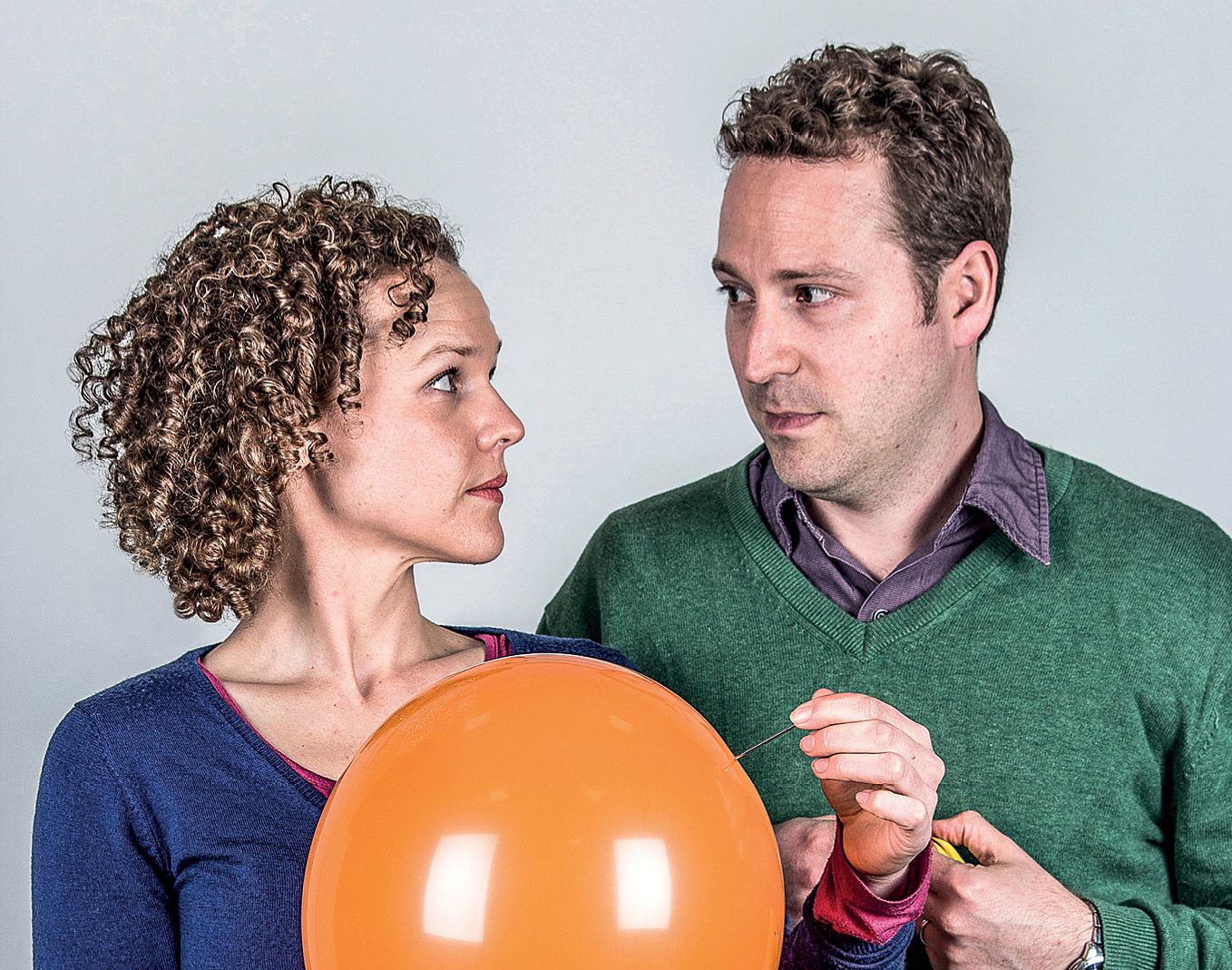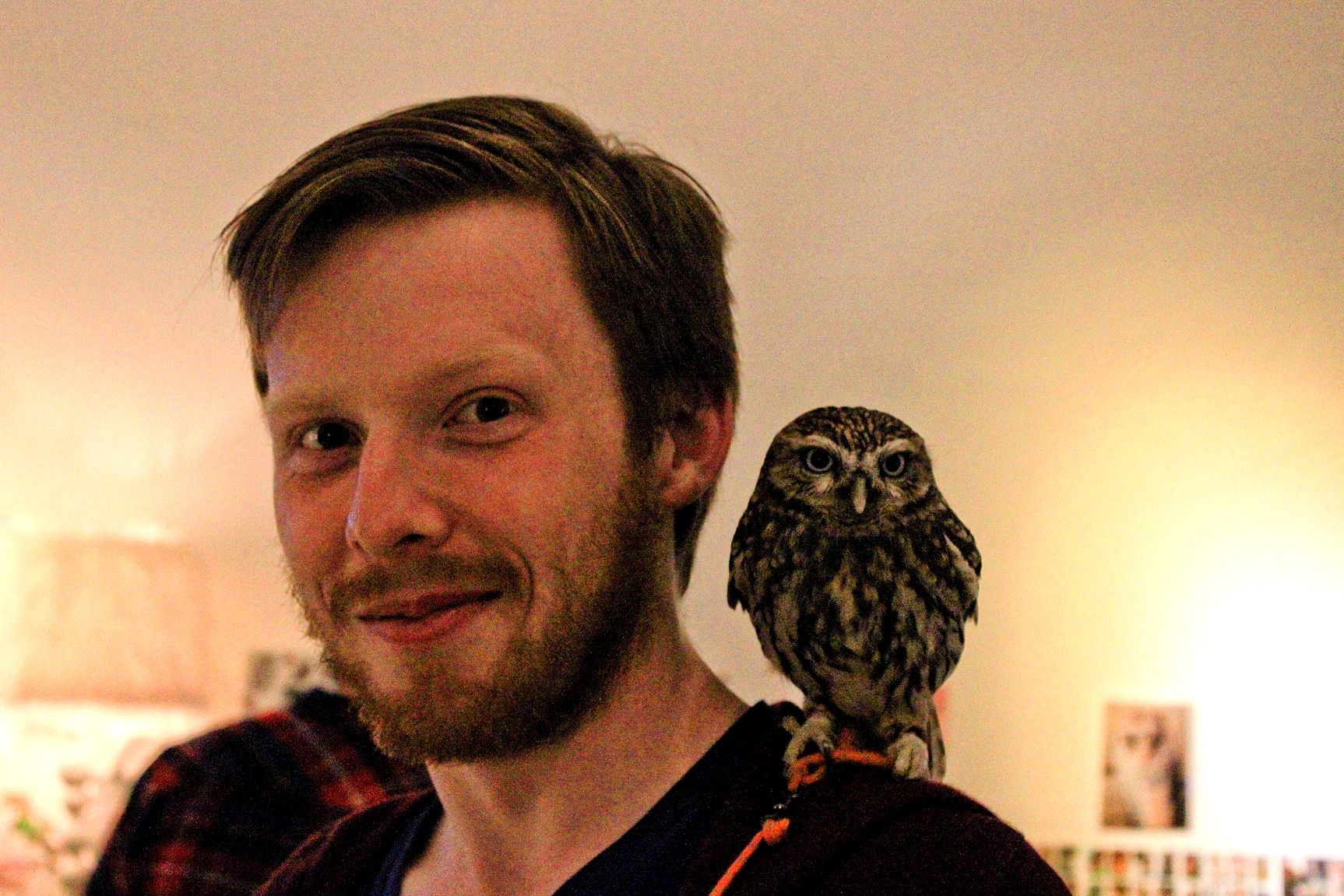Review: Two Mortals
Adam Goodall reviews Two Mortals
The man wanted to be present at his own funeral, is what the mortician says.
The mortician’s telling us about a client. Or, more accurately, Rachael Dyson-MacGregor is repeating what the mortician’s telling us about a client while dragging a limp Mike McEvoy across the stage.
But anyway.
The client wants to be present at his own funeral. He’ll be dead, of course, but he’ll ‘be’ there – sitting in a chair, wearing a suit, around people. The mortician tells him it’s impossible. After all, things happen to a body when it dies, things that make it difficult to prop it up in a chair for an entire wake. Have you considered, the mortician asks, maybe just recording a nice DVD message?
Of all the stories in Two Mortals, the latest out of the Theatre Beating brains trust, it’s the mortician’s that’s stuck with me the most. That’s because it taps into a fear I’ve long felt: a fear of the possibility that I’m irrelevant and destined to go on that way, forever missing out on things. The story resonates because I recognise the man who wants to be at his funeral. It resonates because it might as well be me.
*
Two Mortals is a headphone-verbatim piece that aims to open a conversation about what it means to ‘come to terms’ with death. Devised and curated by Australian actors Rachael Dyson-MacGregor and Mike McEvoy, they perform interviews they’ve conducted with nurses, counsellors and people who’ve lost loved ones; they read Facebook comments about death and loss; they even interview two random audience members in the foyer before the show, performing those interviews on the night. (Dyson-MacGregor and McEvoy have an instinct for this kind of performance, and those night-of interviews are exhibition pieces, demonstrations of their inhuman comfort working in the format, as much as they serve the conversation.)
The material shifts between comedy and melancholy with grace, never trying too hard for either. One minute, we’re listening to a mortician cracking jokes about the difficulties of cremating people who have pacemakers; the next, the ordinary poetry of someone recounting a relative’s peaceful death in hospital. This is at least in part down to the way the script’s structure balances the conflicting emotions you inevitably run into when talking to anyone about death. More so than any other verbatim show I’ve seen, though, Two Mortals manages its tone through its form.
Productions of verbatim theatre, more often than not, rely on the text for their power. However, when when you restage an interview with elements that weren’t present in that interview, you run the risk of decontextualising it, robbing it of that perceived power. The understandable instinct, then, is to play it faithful: no music, no movement, just a reproduction of the original interview that tries to preserve as much of the original context as possible. This is by no means a bad thing: Miranda Harcourt’s Portraits, as presented by Last Tapes and Justspeak over the last two years, is a great example of how a certain type of verbatim show is better served by a focus on faithfulness. But for some verbatim shows – particularly those unified around a theme - it can be a trap that discourages verbatim performers from recontextualising material, from finding hidden truths in what’s being said and bringing those to the fore.
It’s to their credit that Dyson-MacGregor, McEvoy and director Geoff Pinfield seem interested in the pursuit of those truths more than anything else, and this is reflected in the beautiful way that Two Mortals flows and moves. Facebook comments loop and cut into each other, fears and desires tossed into the void to compliment and reflect everything else; balloons are thrown into the house-lit seating block, the audience encouraged to bat them about; members of the audience are asked what they’d do if they had two hours/days/years to live, death made fun by the balloon party around it. Dyson-MacGregor and McEvoy re-enact interviews in tandem, sometimes in-sync, sometimes cutting over one another. They editorialise, verbally (jumping out of the interview to ask rhetorical questions about dealing with death) and physically (as when Dyson-MacGregor pulls McEvoy around the stage during the mortician’s interview, trying to control him as he flops around in a particularly gross way). Pinfield’s got a knack for injecting this kind of surging, playful energy into dense, text-heavy shows, as we’ve seen in the likes of Real Fake White Dirt and On The Conditions And Possibilities Of Helen Clark Taking Me As Her Young Lover, and it makes all the difference here.
That energy carries into and informs the interviews. It makes them more accessible – important when dealing with a sensitive, intimidating subject like death – and it also highlights the way each interview feeds into the show’s broader conversation. Dyson-MacGregor and McEvoy’s irrepressible energy foregrounds the positives one can take from things like co-dependence, reconciliation and gallows humour, albeit to the point that when that energy shifts in the second half, it’s a bit jarring.
Where the first half is big and driven by enthusiasm, the second is calm, precise. It takes place almost entirely in darkness, only interrupted for brief, illustrative tableaus. It is jarring, but it’s a necessary signal, expanding the stage, stories and scope of the play. Interviews, no longer individually attributed, deal with near-death experiences, the potential for death-defying future tech, and preparing for death in the here and now. A beautiful melancholy hum of a score runs under everything, building a universal monologue. It by no means stops being funny (there’s some hilarious speculation about what the aforementioned future tech might be), but the tone is more contemplative, and that’s entirely down to framing.
I love the way that Two Mortals comes to life. I’ve never seen a verbatim show do anything like it.
*
Talking to a friend about the show two days later, I realised that I didn’t remember much of its content. This review probably makes that obvious.
This isn’t the show’s fault.
I’ve never really had to deal with death. In my twenty-five years, only a handful of people I know have died, and I’ve only been particularly close with one of them. It’s not a thing I dwell on or have any trouble talking about, because there’s simply no personal element to complicate it.
Two Mortals aims to open a conversation about what it means to ‘come to terms’ with death. But I’ve never needed to come to terms with death, because I don’t know death. It’s not in my life. I admire how Two Mortals addresses death in all its complications, how it handles incredibly personal stories and experiences in sensitive, humane ways. I know this is a great show. But it’s not having a conversation with me, and that’s entirely the point. And that’s entirely fine.
For one story, though, it is having a conversation with me. The man wanted to be present at his funeral. The mortician says that. I remember this. I remember the words. The movements. The undercurrent of fear in the man’s request. The anxiety that one day I’ll miss something important, I won’t be present, and the world will just pass me by.
I remember that.
Two Mortals plays at Circa Two from 1 - 18 April
Tickets available through Circa

